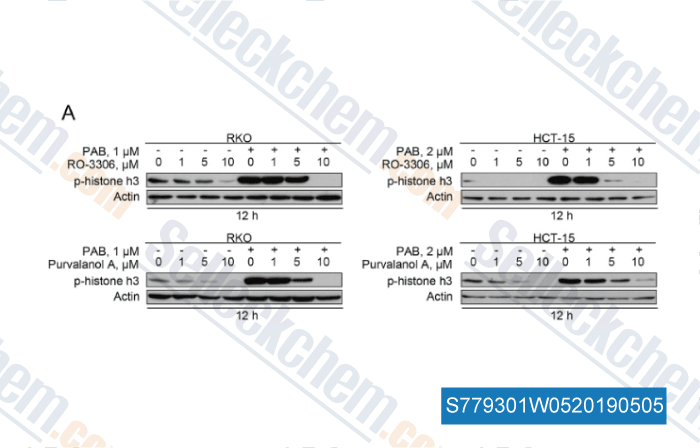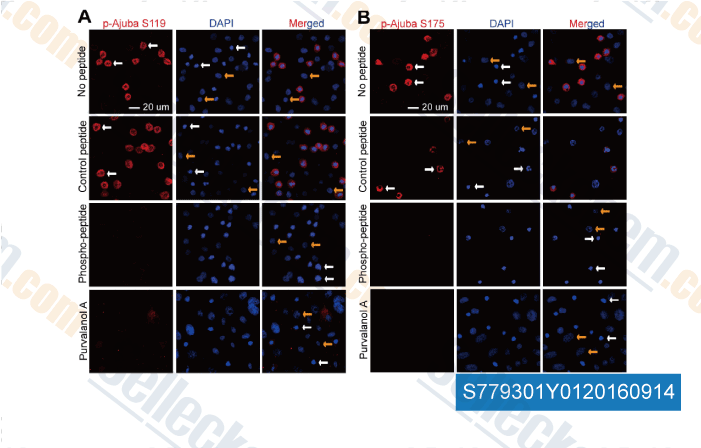|
Toll Free: (877) 796-6397 -- USA and Canada only -- |
Fax: +1-832-582-8590 Orders: +1-832-582-8158 |
Tech Support: +1-832-582-8158 Ext:3 Please provide your Order Number in the email. |
Technical Data
| Formula | C19H25ClN6O |
|||
| Molecular Weight | 388.89 | CAS No. | 212844-53-6 | |
| Solubility (25°C)* | In vitro | DMSO | 60 mg/mL (154.28 mM) | |
| Ethanol | 13 mg/mL (33.42 mM) | |||
| Water | Insoluble | |||
|
* <1 mg/ml means slightly soluble or insoluble. * Please note that Selleck tests the solubility of all compounds in-house, and the actual solubility may differ slightly from published values. This is normal and is due to slight batch-to-batch variations. * Room temperature shipping (Stability testing shows this product can be shipped without any cooling measures.) |
||||
Preparing Stock Solutions
Biological Activity
| Description | Purvalanol A is a potent, and cell-permeable CDK inhibitor with IC50 of 4 nM, 70 nM, 35 nM, and 850 nM for cdc2-cyclin B, cdk2-cyclin A, cdk2-cyclin E, and cdk4-cyclin D1, respectively. Purvalanol A induces endoplasmic reticulum stress-mediated apoptosis and autophagy. | ||||||||
|---|---|---|---|---|---|---|---|---|---|
| Targets |
|
||||||||
| In vitro | Purvalanol A decreases cell viability in dose-dependent manner in MCF-7 and MDA-MB-231 cell lines. Purvalanol A induces cell viability loss by 50 % in MCF-7 cells but MDA-MB-231 cells sre less sensitive to Purvalanol A (32 % decreases in cell viability). Purvalanol A induces mitochondria-mediated apoptosis in MCF-7 and MDA-MB-231 cells.[2] Purvalanol A effectively prevents c-Src-mediated transformation by inhibiting both cell cycle progression and c-Src signaling, and effectively suppresses the anchorage independent growth of some human cancer cells in which c-Src is up-regulated. Purvalanol A has a stronger inhibitory effect on the anchorage-independent growth of HT29 and SW480 human colon cancer cells. [3] |
Protocol (from reference)
| Cell Assay:[2] |
|
|---|
References
|
Customer Product Validation

-
Data from [Data independently produced by , , Cancer Lett, 2016, 383(2):295-308]

-
Data from [Data independently produced by , , J Biol Chem, 2016, 291(28):14761-72.]
Selleck's Purvalanol A has been cited by 17 publications
| ASPP2 Is Phosphorylated by CDK1 during Mitosis and Required for Pancreatic Cancer Cell Proliferation [ Cancers (Basel), 2023, 10.3390/cancers15225424] | PubMed: 38001686 |
| Combined inactivation of CTPS1 and ATR is synthetically lethal to MYC-overexpressing cancer cells [ Cancer Res, 2022, canres.1707.2021] | PubMed: 35022212 |
| MARK2 regulates chemotherapeutic responses through class IIa HDAC-YAP axis in pancreatic cancer [ Oncogene, 2022, 41(31):3859-3875] | PubMed: 35780183 |
| Combined inhibition of EZH2 and ATM is synthetic lethal in BRCA1-deficient breast cancer [ Breast Cancer Res, 2022, 24(1):41] | PubMed: 35715861 |
| The phosphatase CTDSPL2 is phosphorylated in mitosis and a target for restraining tumor growth and motility in pancreatic cancer [ Cancer Lett, 2021, 526:53-65] | PubMed: 34813892 |
| Phosphorylation of CRMP2 by Cdk5 Negatively Regulates the Surface Delivery and Synaptic Function of AMPA Receptors [ Mol Neurobiol, 2021, 10.1007/s12035-021-02581-w] | PubMed: 34773219 |
| Target RNA modification for epigenetic drug repositioning in neuroblastoma: computational omics proximity between repurposing drug and disease [ Aging (Albany NY), 2020, 12(19):19022-19044] | PubMed: 33044945 |
| Transcriptome Analysis and Functional Identification of Adipose-Derived Mesenchymal Stem Cells in Secondary Lymphedema [ Gland Surg, 2020, 9(2):558-574] | PubMed: 32420291 |
| LIMD1 phosphorylation in mitosis is required for mitotic progression and its tumor-suppressing activity. [ FEBS J, 2019, 286(5):963-974] | PubMed: 30600590 |
| The Toxmatrix: Chemo-Genomic Profiling Identifies Interactions That Reveal Mechanisms of Toxicity [ Chem Res Toxicol, 2018, 31(2):127-136] | PubMed: 29156121 |
RETURN POLICY
Selleck Chemical’s Unconditional Return Policy ensures a smooth online shopping experience for our customers. If you are in any way unsatisfied with your purchase, you may return any item(s) within 7 days of receiving it. In the event of product quality issues, either protocol related or product related problems, you may return any item(s) within 365 days from the original purchase date. Please follow the instructions below when returning products.
SHIPPING AND STORAGE
Selleck products are transported at room temperature. If you receive the product at room temperature, please rest assured, the Selleck Quality Inspection Department has conducted experiments to verify that the normal temperature placement of one month will not affect the biological activity of powder products. After collecting, please store the product according to the requirements described in the datasheet. Most Selleck products are stable under the recommended conditions.
NOT FOR HUMAN, VETERINARY DIAGNOSTIC OR THERAPEUTIC USE.
